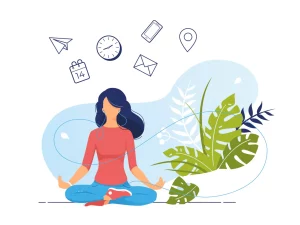Why Time for Yourself Is Essential for Mental Health
Jessica White August 8, 2025
In a culture that increasingly values productivity and constant connectivity, taking time for yourself has become not only rare but sometimes stigmatized. Yet, research shows that carving out intentional alone time is not a luxury—it’s a necessity, especially when it comes to mental health. With burnout rates at an all-time high and digital fatigue becoming a recognized concern, prioritizing solo time has emerged as a powerful countermeasure to modern stressors.
This article explores why time for yourself is essential for mental health, drawing on recent studies and expert perspectives, and offers practical ways to incorporate this habit into your lifestyle.

The Rise of “Alone Time” in a Hyperconnected World
In recent years, there’s been a noticeable shift toward valuing solitude—not as a sign of loneliness, but as a form of self-preservation and mental clarity. Platforms like TikTok and Instagram have seen a surge in hashtags like #solodate, #quietluxury, and #softlife, reflecting a growing cultural trend: people are actively seeking space away from the noise.
Digital overload and constant social interaction—whether online or offline—are known to contribute to mental fatigue. According to a 2023 report by the American Psychological Association (APA), over 63% of adults said they feel mentally exhausted due to ongoing digital engagement and social comparison on platforms.
“Time alone gives us the opportunity to regulate our emotions, plan our lives, and get to know ourselves better,” says Dr. Thuy-vy T. Nguyen, a leading researcher in solitude and mental health at Durham University.
The Mental Health Benefits of Spending Time Alone
Setting aside time for yourself can have measurable impacts on your emotional and psychological well-being. Below are some of the primary mental health benefits backed by research:
1. Improved Emotional Regulation
Spending time alone allows the brain to slow down and process emotions more effectively. Without external distractions, you become more attuned to what you’re actually feeling, which helps in reducing emotional reactivity.
According to a 2021 study published in Personality and Social Psychology Bulletin, individuals who regularly spend time alone demonstrate better emotional clarity and coping strategies during high-stress situations.
2. Enhanced Creativity
Moments of solitude often lead to deeper thinking and innovative ideas. Without the pressure of social performance, the brain can enter a more reflective, imaginative state.
A study by the University of Buffalo found that people who embrace solitude—rather than avoid it—score higher on creativity tests.
3. Reduced Anxiety and Stress
Time alone can reduce exposure to stress triggers such as social expectations, work pressure, and constant communication. The act of simply being still or engaging in solitary hobbies can bring cortisol levels down significantly.
4. Increased Self-Awareness and Confidence
When you spend time by yourself, you build a stronger connection with your inner voice. This can lead to better decision-making, stronger boundaries, and a clearer sense of personal values.
Why We Struggle to Make Time for Ourselves
Despite the known benefits, many people feel guilty or selfish when they prioritize alone time. This stems from societal conditioning that equates busyness with worthiness.
- Work culture glorifies hustle.
- Social media promotes constant connection.
- Family roles often require self-sacrifice.
Psychotherapist Lori Gottlieb notes that “many clients resist taking personal time because they feel it means they’re letting someone else down.” But the opposite is often true: when you care for yourself first, you’re more equipped to support others.
Practical Ways to Make Time for Yourself Without Disrupting Your Life
Taking time for yourself doesn’t require a full weekend retreat or disconnecting entirely. It can be integrated into your daily routine in manageable ways.
1. Micro-breaks Throughout the Day
Take 5–10 minute breaks every couple of hours to breathe, stretch, or simply sit in silence. These micro-moments can lower stress and reset your focus.
2. Schedule “No-Plan” Time
Block out an hour or two on your calendar where you intentionally have no meetings, social events, or errands. Use this time however you choose—reading, journaling, walking, or doing nothing.
3. Practice Tech-Free Time
Reserve specific times (like early morning or before bed) where you put your devices away. This creates mental space and reduces digital fatigue.
4. Explore Solo Activities
Pick up hobbies that can be done alone, such as painting, writing, gardening, or hiking. These activities provide both engagement and relaxation without social pressure.
5. Learn to Say No
Declining events or obligations that deplete you is a skill worth building. Setting boundaries is a crucial step toward preserving your mental energy.
What the Experts Say
Recent research has increasingly validated the mental health value of solitude.
- Harvard Health notes that people who spend time alone are more likely to experience reduced symptoms of depression and improved mood stability.
- A 2024 study by the University of California found that adults who engage in at least 30 minutes of intentional alone time daily reported lower stress levels and better sleep quality.
- The Cleveland Clinic suggests that carving out alone time helps reset the nervous system and supports overall well-being.
Dr. Laurie Santos, Yale psychology professor and host of The Happiness Lab, highlights that many of us “underestimate how much we need a pause.” She emphasizes that downtime isn’t just restful—it’s essential for brain function.
Shifting the Narrative Around “Me Time”
To make real changes, we need to challenge the belief that time for yourself is indulgent. Instead, we should recognize it as a critical pillar of mental health—just like sleep, nutrition, or exercise.
Rather than filling every free moment with scrolling or multitasking, consider this: what if rest was productive in itself?
Making room for solitude isn’t about escaping responsibilities—it’s about fortifying yourself to meet them with clarity, balance, and resilience.
Conclusion
Time for yourself is essential for mental health—not just because it feels good, but because it helps you function at your best. In an overstimulated, always-on world, reclaiming space for yourself isn’t selfish—it’s survival.
By making intentional solitude a part of your routine, you give your mind the reset it needs to process, heal, and grow. Whether it’s five minutes or a full afternoon, the act of being alone—with purpose—can be one of the most restorative practices you adopt.
References
- American Psychological Association. (2023). Stress in America survey. Available at: https://www.apa.org (Accessed: 8 August 2025).
- Harvard Health Publishing. (2023). The power of alone time. Available at: https://www.health.harvard.edu (Accessed: 8 August 2025).
- Nguyen, T. T. (2021). Solitude and mental health research. Durham University.
Available at: https://www.durham.ac.uk (Accessed: 8 August 2025).







